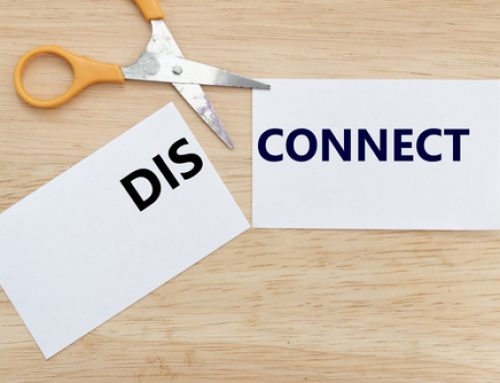SOURCE: Kim Bryan
For most people, it’s unimaginable for a grown man or woman to choose to stop all contact with their parents. The people who provided food, clothes, and shelter, attended dance recitals, volunteered at school, or cheered from the bleachers during every Friday night’s football game don’t deserve to be abandoned in their old age just because they made some parenting mistakes, right?
Wrong.
According to Monica Ross, LPC, “If either party feels as though they cannot be respectful, loving, and supportive towards the other, then yes, it’s time to move on and find those with whom one can. This is true for family members, friends, coworkers, and really anyone one would surround oneself with.”
Dysfunction, especially when combined with abuse, does not end once a child reaches adulthood or because the abuser begins to get old. By then, the abusive parent is well-versed in the tactics needed to make their children do what they want, and these behaviors are likely to continue right up until the parents’ death, unless someone—usually the abused—makes it stop.
I am one of those people who recognized slowly what was happening to me. I didn’t make the choice to “break up” with my parents overnight, and I’m not happy I have no relationship with them. I’m sad my family is broken. I wish it was different, but it isn’t.
If my parents had been willing to really listen to what their adult child had to say, to respect and consider it, the outcome would have been entirely different. Yet as I’ve learned in my journey to understand and heal, I am not alone. Thread after thread of internet discussions are filled with the stories of people who’ve made multiple attempts to repair unhealthy relations and have eventually disowned or gone no-contact with the people who raised them.
Alternatively, forums for the parents of estranged children are frequented by those who claim their son or daughter never explained their reasons for walking away. If you are estranged from your adult child, chances are they have told you why—you just chose to ignore it. And it’s likely that it was one of these five reasons:
5 Reasons People End Their Relationship With Their Parent
Why Do People Stop Talking to Their Parents?
1. The Parent Disrespects the Adult Child’s Spouse
Like me, many consider their parents’ behavior normal until they marry. Looking at your parents from your significant other’s perspective can be eye-opening.
Not having grown up under your parents’ manipulations, as a new daughter- or son-in-law, your spouse may be unwilling to participate in the dysfunction that feels so natural to you. The parent who has always controlled you also expects to control your spouse, and when this fails to happen, it often results in contention, smear campaigns, and petty complaints designed to either force the new son- or daughter-in-law into compliance or get rid of them entirely via divorce.
Parents must respect their adult children and their spouses, regardless of whether they like them or not, even if you have differing expectations about family roles. You do not get to choose whom your children love. Respecting your son/daughter-in-law does not mean condoning or agreeing. Whether you want to admit it or not, you are not—nor can you ever be—the most important person in your adult child’s life at all times. He cares about other people just as much as he cares about you. The sooner you understand that, the better off you’ll be.
2. The Parent Refuses to Apologize
The refusal to apologize is a red flag for narcissistic personality disorder: It allows someone to justify their hurtful actions and words and blurs reality. Time and again, their children will try to make them understand a different perspective, but they continue to fail to see their own culpability. They gaslight their children into believing they are at fault and force them to apologize in order to mend the family.
To paraphrase the late Albert Einstein, the definition of insanity is doing the same thing over and over again and expecting different results. This applies to the relationship you might have with your parents. You’ve been running for years and yet you’re still in exactly the same place as you were as a child. You might realize you have to get off the hamster wheel.
When we hurt people, we ought to apologize without justifying. Just a simple “I’m sorry, please forgive me” is enough. As Dr. Phil once said, “‘But’ means forget everything I just said.”
I confronted my mother…. She gaslighted me, meaning she told me my perceptions were incorrect…. My mother sneered, ‘You have a very vivid imagination.’
— Misty Kiwak Jacobs, A Word Please.org
3. Overbearing and Undermining Grandparenting
A disordered parent sees their child as an extension of themselves, not as an individual, and grandchildren are but one more step on the ladder of “me.”
- Did you insist on participating in naming your grandchildren? Not okay.
- Have you ever said, “It’s okay, Grandma will let you do it” when the parents said no? Undermining is not okay.
- Did you ever demand to have your grandchildren for certain events or visits? Ask, don’t demand. If you’re told no, respect it.
- Stop giving the grandchildren sugar when their parents ask you not to. How you did it then wasn’t the way they did it before and certainly not the way they do it now.
- If you still think Mother’s Day or Father’s Day is all about you, you’ve got another think coming.
- You’re not smarter than the pediatrician.
- Sparing the rod does not always spoil the child.
- No, it’s not okay to encourage your grandchild to love you more than his/her parents.
- Stop trying to buy your grandchild’s love with gifts.
- You’re not entitled to “alone time” with your grandchildren and your insistence on such is creepy.
- Quit taunting your grandchildren with scary stories and insulting “jokes.” You’re being a bully.
- And last but not least, for the love of all that is good, quit buying the grandchildren pets without the parents’ permission!
The older generation must learn the difference between parenting and grandparenting. Your days of making all the decisions are over. In this new chapter of your life, your role is to give unconditional love and guidance, but it is a privilege, not a right. A grandchild is not your prodigy, nor are they your property. Be thankful for the time you are given rather than resentful over what you think you deserve.
If you want to make sure you don’t repeat your toxic parents’ mistakes, read 8 Signs of Bad Parenting That Every Parent Should Know.
Parents will always hold their children in their closest circle of relationships. But those children grow up to have children of their own who fill their parents’ closest circle, and the oldest generation gets bumped to the outer edges. If this happens, the older generation loses a primary relationship, so you might say that the parent’s loss is greater.
4. The Parent Plays Favorites Among Siblings
In early childhood, siblings in disordered families are assigned roles as either a scapegoat or a golden child. A golden child seldom suffers consequences for misbehavior and is often praised and applauded, while the scapegoat shoulders the blame for the family’s dysfunction and suffers the brunt of the consequences.
Although the role one plays may be fluid, those who are mostly scapegoats are often the first (and sometimes only) ones to see and name the dysfunction—and this seldom goes very well. Eventually, the scapegoat realizes they are alone, even among family. Some will continue to try, but many will just walk way. Cutting off toxic parents is often the only way to make sure the cycle doesn’t continue.
Get therapy if you have been accused of paying favorites. Even if you don’t believe it’s true, talk to a therapist. Seriously, therapy.
5. Ignored Boundaries
Last but not least is the refusal of the older generation to respect the boundaries of the child/parent relationship. Because disordered minds struggle to understand boundaries, I believe this reason is better explained with examples.
- Prying into your child’s finances and/or offering unsolicited financial advice is overstepping.
- Insisting on being present for the birth of a grandchild is wrong. Nobody but the mother-to-be and her birthing staff have the right to be in the room.
- Giving undergarments and sex toys as gifts is inappropriate. Doing this is crossing more boundaries than I have time to list.
- Stop insisting on spending all holidays with your adult child and behaving badly if it doesn’t happen. You’re an adult, for goodness sake, quit acting like a child.
- Quit demanding “alone time” with your adult child away from their significant other. Sure it’s nice, but as I mentioned with grandchildren, your insistence on such is downright creepy and concerning.
- Discussing your marital troubles with your adult child is wrong and crosses so many hill-to-die-on boundaries. Tell it to your best friend, or may I recommend a therapist? Whatever you do, don’t discuss it with your child.
- Criticizing clothing choices, hairstyles, companions, careers, religion or lack thereof, parenting styles, and the like is crossing boundaries. It is an utter and complete disrespect for your children’s right to choose what is best for themselves.
A majority of boundary crossing is rooted in a parents’ inability to believe in their children. Ask yourself, “Why would my child make a bad choice? Did I not teach him the tools needed to make good decisions?” If your immediate response to is to think, “I did teach them to make good decisions but they’ve made so many bad ones in the past,” your inability to accept your role in their repeated bad decisions is having severely adverse effects on your relationship.
At some point, the older generation must trust they have raised their children to make good decisions and respect those decisions. If you can’t do this, you need to work out why with a therapist. In the meantime, keep your opinions to yourself and stop trying to “save them” or “fix” things. You’re only making it worse, I promise.
They had been maligning me my whole life. . . not in a way of telling people I was a horrible person but making it seem as if I was a poor, befuddled soul, a hapless idiot, borderline mentally disturbed, a pathetic loser. None of this was true. It never was. Once I got away, my life got so much better. Oh, so much.
— Anonymous, r/raisedbynarcissists, Reddit.com
Statistics About Family Estrangements
A British report called “Hidden Voices: Family Estrangement in Adulthood,” which describes a survey of over 800 people who self-identified as having estranged from all or part of their family of origin, offers some relevant data:
Who is more likely to break ties: males or females? How does gender affect closeness?
It’s more common to be estranged from a mother than a father or both parents. Conversely, it’s more common for daughters to estrange than sons.
However, when males estrange, it seems to be more final or longer-lasting: the average estrangement from fathers lasts 7.9 years (compared to an average of 5.5 years for mothers), and estrangements from sons average 5.2 years (with 3.8 years for daughters).
Who tends to estrange permanently: males or females?
29% of respondees described a final break with a mother, and 37% reported a final break with a daughter. Conversely, 36% described a final break with a father, and 41% with sons. So sons and fathers are more likely to experience permanent closure than daughters and mothers.
What about intermittent estrangements?
We have some insight into on-again-off-again estrangements, where family members cycle in and out of closeness over the years. 21% said their had been five or more of these cycles with mothers, where 16% experienced them with fathers. So it’s more likely for mothers to experience intermittent estrangements over the years.
Who is most likely to cut off contact: parents or children?
The younger generation is usually the one to break ties. Over half of people who “divorce” a parent say they were the ones who made the move.
Is there any chance the relationship will be mended?
- According to the parents, yes: Most parents hold out hope that they will reconcile with their child.
- But according to the younger generation, no: More than 70% of respondents said there was no chance they’d resume communication.
- And according to experts like Sheri Heller, LCSW, a NYC psychotherapist and interfaith minister in private practice, “If PD abusers lack the capacity for insight and positive change, it is likely they will persist with predation, denying their perfidious motives, and evidencing an absence of sincere remorse. To re-engage with this degree of pathology puts the adult victim at risk for regressing into dysfunctional interpersonal patterns, succumbing to guilt and cognitive dissonance, getting mired in confused roles, and being flooded by abandonment panic. For many, this constitutes a deal-breaker which results in finality.”
If you are having trouble cutting the ties or want to know the healthiest ways to do it, read When and How to Cut the Ties of Bad Family Relationships. On the other hand, if you’re looking for ways to deal with your parents rather than disowning them, read5 Strategies for Dealing With Difficult Parents.
Will You Ever Find Out Why Your Son or Daughter Abandoned the Relationship?
The British study found an interesting generational discrepancy when it came to the communication of the reasons for the estrangement. When asked if they “concretely” told their parents why the relationship ended, over 67% said they had. This contrasts dramatically with the parents’ response, where over 60% claimed they were never told why. In other words, many abandoned parents who are rejected by a child don’t consciously know the reason, even though they were explicitly told. So they either forgot or didn’t listen. In fact, they don’t even remember the conversation.
This disparity only emphasizes the breakdown in communication in these families and suggests that the older generation might not be listening or has a hard time hearing what their children are saying, which is probably at the core of the problem.
Is That the End?
In closing, I want to say I am very well aware those listed aren’t the only reasons for estrangement, nor will my advice apply in all situations. I haven’t mentioned trauma, abuse, divorce, or substance abuse. I haven’t talked about undiagnosed mental health issues or those who simply refuse to take their meds. That said, people don’t just walk away from families that are healthy. All families have their issues, but functional families talk about them, try to understand one another’s perspectives, apologize for any hurt they’ve caused or wrong they’ve done, and truly move forward, beyond all that suppressed anger and resentment.
The exact opposite is true of unhealthy, disordered families. I know. I lived in one for more than 40 years. Sadly, I didn’t realize it until the abuse was heaped upon my husband and children as well, but when it became obvious, I demanded that it stop. I tried discussing the matter, only to find myself enmeshed in bitter verbal arguments. I tried using parables and comparisons, pointing out other family dysfunctions and relating them to our own, but that failed, too. I tried many ways to rectify the situation, but every time, I was met with anger and resistance.
Contrary to what they think, I didn’t estrange from them to punish them, I did so to protect myself and my children. I realized I had become just like them and I made a conscious choice to change myself and to bring to an end the generations of dysfunction in my family tree.
Sadly, our story doesn’t end with a happily-ever-after, but I know I made the right decision, and I know I’m not alone. Every day I read stories, online support group threads, estranged child forums, and talk with people around the globe who feel they had no other choice but to walk away. Not a single one of us is happy about it. Relieved it’s over, yes, but certainly not happy with how or why.
I’m also privy to the perspectives of rejected parents. One commonly stated complaint among parents who have no contact with their children is that their child’s behavior toward them reminds them of how they were treated by their own parents when they were young. If this is you, I want you to ask yourself, “If my parent was that way and my child is that way, isn’t it possible I am, too?”
Some will read this and take it to heart. They’ll reconsider the things they’ve said and done because they want to repair their broken relationship with their child and are willing to do whatever is necessary to do so. Unfortunately, however, many readers will be inclined to argue and resort to writing long comments complaining about their child to a bunch of internet strangers.
I can’t change everyone. I couldn’t even change my own parents. Hopefully, however, I’ll get someone’s attention and set in motion positive change for another dysfunctional family out there.
This content is accurate and true to the best of the author’s knowledge and is not meant to substitute for formal and individualized advice from a qualified professional.
SOURCE link: https://wehavekids.com/family-relationships/adult-child-estranged-reasons





